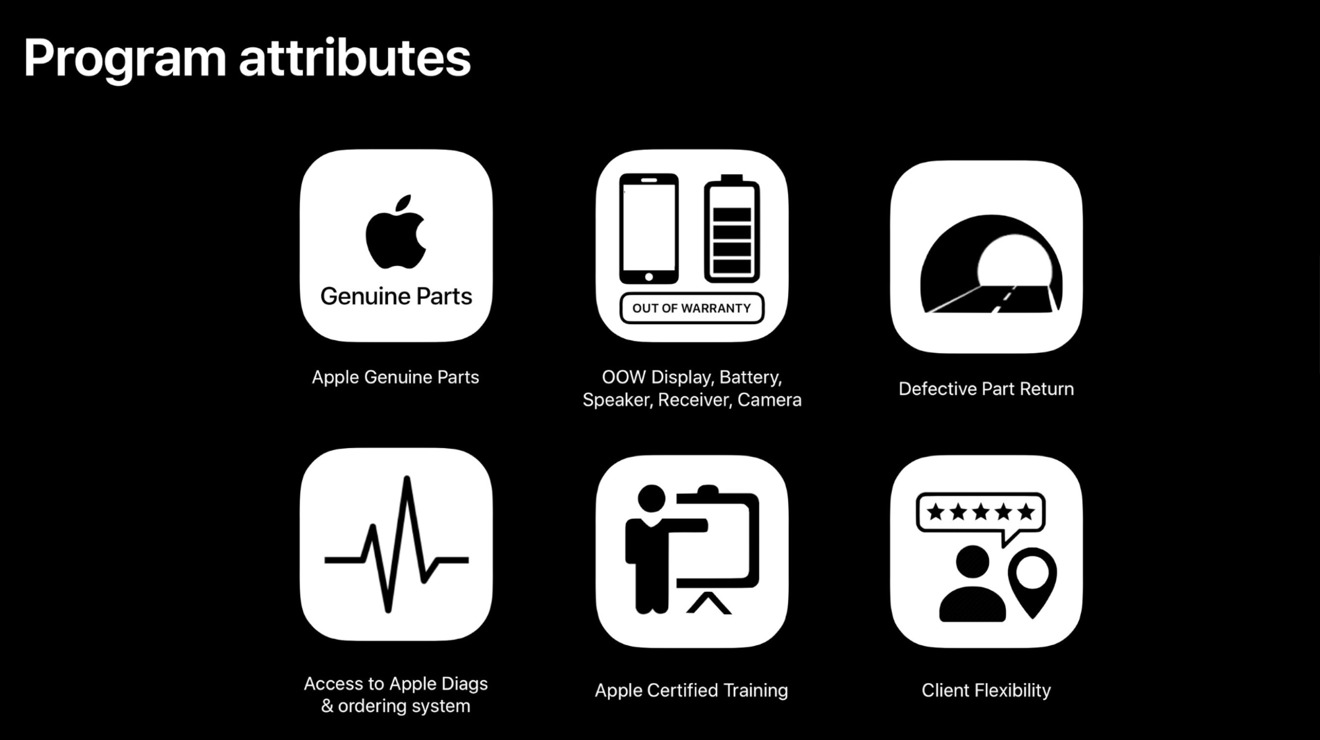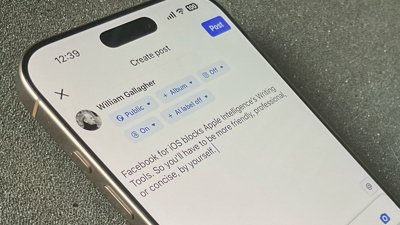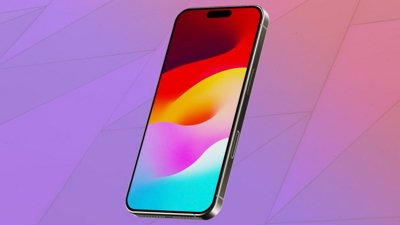A new report has unearthed details about a "Apple Genuine Parts Repair" program, which puts Apple service materials in the hands of some companies with fewer restrictions than current service providers may be under.
Apple has had a path for companies to become an authorized service provider for decades, with requirements for the program varying dramatically across the years. The new "Apple Genuine Parts Repair" program may be lightening that up somewhat, but there are few firm details on what Apple will require to qualify for the new program.
The report, and leaked presentation slides, published by Motherboard, suggests that the program is already in place at a few vendors. Vendors cited are Mobile Kangaroo in California, Simple Mac in Salt Lake City have access to the program, as well as Makina Technologies in Dubai.
The program appears to specifically allow repair shops to do things that Apple-authorized centers have been doing for years, without telling Apple. For instance, there are specific prohibitions on swapping in a "known-good" component not from Apple's stock for troubleshooting, requiring a service replacement part be ordered first.
Specifically, the presentation slides say that providers can "keep doing what you're doing, with Apple genuine parts, reliable parts supply, and Apple process and training." Additionally, the details don't limit the parts to iPhone, iPad, or Mac and include all three.
How the system works now, and where it may change
At present, for most authorized service centers, few if any parts are kept in stock. The remainder are ordered after the diagnostic process is complete, and shipped FedEx to the repair shop. The shop performs the repair, and must return the "core" failed part to Apple for examination, refurbishment and return to service stock, or both.
In the case of a warranty repair, Apple picks up the tab for the difference between the core price and the non-return price. Otherwise, the shop pays the bill, which is then passed to the customer. Core prices are often up to 75 percent the cost of the whole part, ordered new. So, part accountability is important, and Apple has put prohibitions in place to prevent shops from selling directly to customers as a result of abuse in years gone by.
Shops selling parts to users is grounds for a loss of Apple-authorized status — which can be financially deadly. At present, it isn't clear if the requirement for service centers to perform a "core" swap is retained in the new program, nor if they will be allowed to sell parts directly to customers. It doesn't seem likely that Apple will loosen either requirement.
It also isn't clear if there will be an upper line that these providers can't cross. For instance, Apple may choose to retain the hardware for linking parts after a repair involving something involving the secure enclave is performed. Board-level repair, such as that performed by Louis Rossmann is likely to be frowned upon as well.
Immediate reaction
Apple repair venue iFixit doesn't think the rumored program goes far enough.
"To start, Apple's plan appears to be rather limited. We know they've talked to big repair chains, but they have not spoken to any of the smaller repair shops we contacted," wrote iFixit in a post on Thursday afternoon. "If only the large national chains get access to these parts, the independent shops— ... get left out in the cold, and will likely lose business as a result. This continues to encourage a repair monoculture that stifles competition, job creation, and innovation in the repair space."
"Apple would like you to think that independent shops are a sketchy, dangerous minefield of service options that use low-quality parts that can lead to problems down the line. And in some cases, that may be true— but that's Apple's fault, not the repair shops'," iFixit continues. "If Apple would just provide OEM parts to independent repair shops at a reasonable price, these risks would be far smaller."
Potential sea-change, if accurate
AppleInsider has reached out to Apple for comment, but has not as of yet received a response. Third-party vendors we spoke to after the report was published said that they had heard "rumblings" that such a thing was in the works, but denied having any knowledge that it was imminent.
If the report is completely accurate, it would be the biggest shift in Apple's repair policies since it started enforcing the rules on authorized repair centers in 1979.
Apple has historically opposed right-to-repair laws in places like California, claiming it would expose company secrets and create safety and security problems. While there are innumerable third-party Apple repair firms around the world, only Apple and its authorized service providers are able to perform full service in a way that doesn't void warranties. Presently, the company doesn't provide parts or repair manuals outside of its official network.
Twenty U.S. states have some form of right-to-repair legislation under consideration. Apple is one of several tech companies lobbying politicians to act in its favor.
 Mike Wuerthele
Mike Wuerthele


-m.jpg)






 William Gallagher
William Gallagher

 Andrew O'Hara
Andrew O'Hara
 Wesley Hilliard
Wesley Hilliard

 Malcolm Owen
Malcolm Owen
 Marko Zivkovic
Marko Zivkovic





-m.jpg)




17 Comments
Good news - Anything that makes it easier to get your device repaired properly with quality parts is a good thing. Hopefully the right to repair movement keeps progressing as well.
I’ll just point out the obvious example of the state of automobile repair shops. Any swinging dick can hang out a shingle that says Auto Repair with no requirements, licensing, or training. A couple of times a year investigative journalists produce segments on shady repair shops that rip customers off with unnecessary repairs and shoddy workmanship. iFixit is blowing smoke when it alleges independent shops are as white as the new driven snow and it’s all Apple’s fault for not allowing repair manuals and genuine parts. Like the automobile repair business the electronics repair business is unregulated, unmonitored, unlicensed, and anyone can set up shop claiming they are experts in the repair of iPhones. You can kiss privacy and security goodby when you hand your iPhone over to one of these places. Like the perverts who place hidden cameras in tanning bed salons, hotel rooms and the like you simply won’t know what was done to your device.
Having Apple authorized Repair Stations is good. Up here we go through London Drugs fro everything we need done from warranty claims to updating iPhone batteries. They're really good.
My fear is that I hear Right To Repair zealots that want manufacturers to sell all parts, and manuals and software to anyone, regardless of training or intent. That would be a disaster. Similarly I keep hearing from some of the more vocal supporters of the RtR movement that everything must be made REPAIRABLE by anyone. No more molded in parts, no more security screws, no more adhesives. You can kiss any waterproofing and most of your durability goodbye with that.